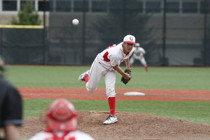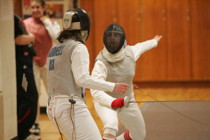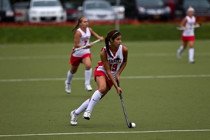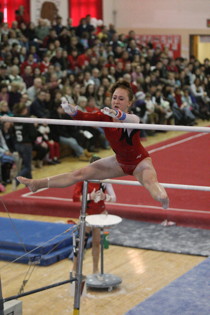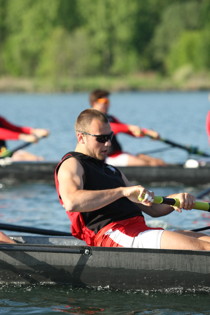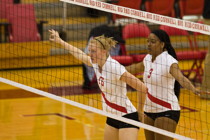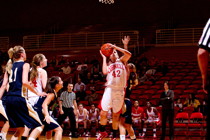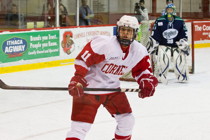LET'S GO BIG RED
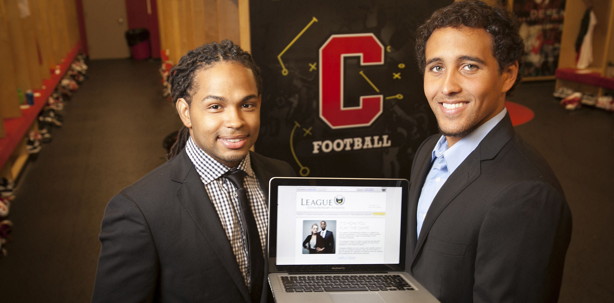
Nick Booker-Tandy '13, left, and Shane Savage '13 display the website and networking tool they created for student-athletes, The League of Extraordinary Athletes, www.leagueathlete.com.
Professional athletes in another sense
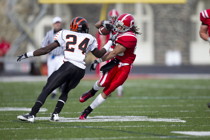
Booker-Tandy in action for Big Red football. See larger image
Senior football players Nick Booker-Tandy and Shane Savage are attractive prospects for potential employers. Both are dean's list students and decorated members of the Big Red football team. But their goal is that employers won't be competing to hire just the two of them – they want employers to find every student-athlete at Cornell. And they want every student-athlete to make professional development a priority.
"We want to create a sense of urgency while they're here to start that search instead of [waiting until] their senior year," says Savage, a 2011 All-America wide receiver and one of the all-time leaders in every category in school history. "They need to be looking ahead right away."
With that in mind, the duo developed The League of Extraordinary Athletes. The goals of The League include increasing the number of quality internships and job placements, the connections among alumni and current athletes who share interests, and the number of career-related experiences during the summers, a down time for many Big Red student-athletes. To do so, Booker-Tandy and Savage created a structure that includes a career prep program, a summer program and an alumni-student database through their new website, www.leagueathlete.com.
Their journey began in AEM 2410, Marketing Plan Development. In developing a marketing plan for the College of Agriculture and Life Sciences' student services office, the duo got a glimpse at tools available to students on campus for professional development. The two also were selected as Cornell's representatives in Management Leadership for Tomorrow (MLT), the nation's premier career development institution that, according to its website, "equips high potential minorities with the key ingredients – skills, coaching and door-opening relationships – that unlock their potential."
Working with MLT, Booker-Tandy and Savage each were given a career coach and walked through the process of preparing for job seeking, from writing a resume to interview prep. The program included intensive workshops and several seminars around the country.
They landed interviews with numerous companies before both accepted internships with Google.
Their teammates took notice and came calling, looking for advice about resumes and interviews for internships and jobs.
Booker-Tandy asked to see one inquiring teammate's resume. They sat down at Trillium and walked through the document.
"I think I know why you're not getting any interviews," Booker-Tandy told him. "Your resume is pretty bad."
"Well, help me fix it," was the response.
Between his suggestions and connections the player had already made with Cornell alumni, he got an interview and a summer internship at an insurance company. Booker-Tandy realized that other Cornell student-athletes could learn the same lessons he and Savage had.
Student-athletes make up approximately 8 percent of the student body, but with little free time due to their academic and athletic commitments, some student-athletes weren't as prepared as their classmates to understand career recruiting.
"What we're trying to do is help them fit professional development into their schedules that already includes classwork, competition and the social life of a college student," Savage says.
There was a definite need to close that career development gap – and almost all the tools needed to fill it were already available on campus.
Enter The League of Extraordinary Athletes.
"As Ivy League athletes, we don't receive scholarships – we're supposed to capitalize on our degree," says Booker-Tandy, a 2011 ESPN The Magazine/CoSIDA Academic All-America cornerback. "We're told: 'You'll be fine in the work world, you have an Ivy League degree,' but that's not always the case if you don't know what to do while you're here."
The business model for The League of Extraordinary Athletes, taken directly from AEM 2410, was three-pronged. First was the Career Prep Program, the educational component tailored to specific class groups. Second was a Web tool to help students and companies search for matches of like-minded interests. Third was Cornell Summers, a program that helps students get real experience on their resume to compete with other job-seeking students.
After coming up with the idea, Booker-Tandy and Savage started making contacts around Cornell – talking to Cornell Career Services, deans, alumni, athletics administrators and students alike. They made presentations to Cornell's coaches, who were excited about the possibilities.
Then came the need to develop and design the website, what they call a "virtual Rolodex." They wanted the site to allow student-athletes to manage every part of the career search process, help alumni stay involved and help companies find and recruit top-tier talent.
Savage's mother, Ann, president of BG Solutions, an advertising agency in Florida, put them in touch with some creative artists. After mocking up the site, Booker-Tandy and Savage found Cornell junior and information science major Joshua Freeberg, who began programming and designing the Web tool from scratch.
"I discussed the program with Shane and Nick and am impressed with what they have developed thus far," said Andy Noel, the Meakem*Smith Director of Athletics and Physical Education. "I take pride in their focused efforts to identify a Web-based solution to promote networking among Cornell athletes, alumni and friends for the benefit of all parties involved."
Booker-Tandy and Savage also created the League Council, involving members of every team. "The fact that students are running this and are in charge of their future is a big reason we think this will be successful," Savage says.
"Originally this was something we just wanted to do for Cornell, but we realized we were having so much fun that we maybe could turn it into a career," Savage says. "We want to fine-tune it here at Cornell and make sure they get everything they can out of it. Then, if it finds the audience, we'll try and go beyond that."

